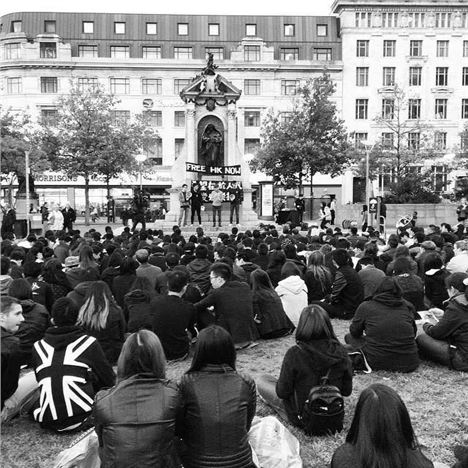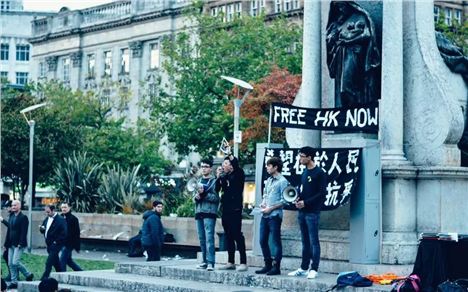OVER 350 people clad in black waved their lit phones and chanted in Cantonese in Piccadilly Gardens on Wednesday.
What's this all about?
This was a show of solidarity for the Hong Kong democratic movement.
The Hong Kong government recently relayed the decision from National People's Congress that the promised universal suffrage in 2017 will be an election of a few vetted, pro-Beijing candidates. Hong Kong students want true universal suffrage. They boycotted class and took to the streets. The police fired tear gas at them. This provoked the general public to come out in support. As you read, they're still there now, but we learn the police are shipping in the rubber bullets. 
China crisis in Manchester
The what?
Though it never had universal suffrage, Hong Kong enjoyed civil liberties as a British colony which were maintained even after the colony was handed back to China in 1997. China, not wanting to destabilise a prosperous economy, promised 50 years of ‘one country, two systems’ and granted concessions sparing Facebook and media that may criticise China. This is encapsulated in Basic Law, Hong Kong's constitution, within which Article 45 requires universal suffrage.
The problem is China's interpretation of ‘universal suffrage’. The two-three candidates from which Hong Kong will vote are vetted by a 1200-strong nomination committee. These are representatives from different sectors of city life but there are lots of questions about just how representative they are and what their relationship with the Chinese Communist Party is.
What's this got to do with Manchester? Why should I care?
This could be a whole other article, but briefly, Manchester had its own defining moment with Peterloo Massacre when the soldiers charged into peaceful crowds, killing at least fifteen people. The crowd had gathered to demand parliamentary reform. The event was a defining moment on the route to democracy. This Manchester example carries resonance for Hong Kong.
On a more pragmatic level, the Chinese account for 50% tax-free retail here, the Manchester-China forum launched last year and direct Manchester-Hong Kong flights are starting December. As a person of Hong Kong origina I appeal also to your curiosity. Hong Kong really does know how to protest. See more below.
One big reason those rubber bullets remain unfired is because the world is watching. Even if China doesn't give a toss what the world thinks, there is a lot of economic interest riding on Hong Kong's stability. Neither money nor social media was at play when tanks rolled into Tiananmen Square.
So what happened in Manchester this week?
Leaflets and presentations recapped what's happening, and students expressed their outrage and rallied others to invest in Hong Kong's future at an open forum. Freedom-themed songs were sang whilst phone flashlights were waved and democracy chants were chanted. Attendees scribbled their thoughts on post-it notes destined for the London Chinese embassy. The gather culminated in a walk to tie yellow ribbons to the Chinatown pagoda, umbrellas held high. All this, thanks to students who pitched in on an individual basis to maintain political neutrality.
Perspectives varied but the ambience was respectful and peaceful and the message was clear: our gathering will still bring support to the protesters, and while we're at it, let's not forget to use the privilege of overseas education to contribute in our own ways to our city's future.
What's with the umbrellas and why is it the umbrella revolution?
Students used umbrellas to shield themselves from tear gas and pepper spray. An image of a man holding up an umbrella shrouded by clouds of tear gas has become the symbol of this movement.
What's China's position?Officially, China says it will ‘steadfastly safeguard’ Hong Kong.
Pro-Beijing commentators refer to concessions China's made since the handover, and point out that Hong Kong never had universal suffrage anyway. They also compare Hong Kong to a once-favoured petulant child biting the hand that feeds, who can no longer compare financially with mainland mega-cities like Shanghai and Chengdu. Protesters are variously criticised for being naïve, unpatriotic, and sponsored/used by occidental politicians.
Making a point, making a stand
What now?
Manchester was amongst 25 other cities gathering in solidarity. The sizeable Chinese immigrant and student communities the world over have stepped out to cheer Hong Kong on. Government-issued press releases walk a tightrope between not burning bridges with China and being seen to be championing human rights.
By the weekend the Chief Secretary will hold open discussions with The Hong Kong Federation of Students, a conglomerate of eight higher education unions. They've supported universal suffrage and class boycott from the start, with principals from prominent universities stepping out in solidarity.
What next?
It's a waiting game. The government hopes the protesters will tire of sleeping on streets and Hong Kong returns to business as usual.
Open discussions sound good, but what they give with one hand, they just as quickly take back with the other, with a further statement saying that there will be no room for compromise on the fundamentals. China doesn't want another Tiananmen, but it also doesn't want to be seen to be weak, or to lose face.
Organisers at Wednesday's gathering say that they too wait are waiting, but signal that if no progress is made, the fight continues in Hong Kong as does the solidarity here in Manchester.
Is this all?
No. Public agenda and sentiment morph by the hour. People come together as much as opinions are divided. Many have asked for the chief executive to step down, whilst others don’t see what this would change since orders come from China anyway. Hong Kong has thwarted attempts to introduce anti-subversion laws as well as the Moral and National Education on how to appreciate the motherland, which is apparently ‘not a brainwashing exercise’. Hong Kong citizens feel their rights are slowly being eroded. And not just their rights. With the rise of the mainland wealth pushing already exorbitant property prices up and the free borders creating a birth tourism phenomenon, resources are scarce and resentment plentiful. All these controversies are being played out in this protest.
That was depressing. Anything to put a smile back on my face?
Absolutely.
The BBC has already commented on how peaceful, polite and clean our protests are. That's saying a lot in sardine-packed streets with limited toilet facilities, temperatures over 30°c, and even more heated debates.
Many side stories don't make it to foreign media. My favourites here show my home town to be generous, disciplined, resourceful and creative:
* Organisation has been impeccable. Logistical needs are identified, publicised, crowd-sourced and addressed. Cardboard signs indicate what is needed (cleaning alcohol, wet wipes) and what isn’t (water, Lucozade).
* Public transport are offering free rides to protest destinations. Cafés similarly show their generosity by offering refreshments, toilets and phone-charging facilities.
* A string quartet played a stirring rendition of "Do you hear the people sing?"
* A democracy forum sees university professors give timetabled lectures on international standards of democracy and Hong Kong's future. Indeed, many students are still doing homework at the protest.
* Inter-generational differences of opinion abound and humour’s a great weapon. A friend chided her pro-China mother, "You wouldn't understand this mum, you're so used to autocracy at home and we've always obeyed you. Isn't that right?" prompting a smile and punctuating a tense familial debate.











